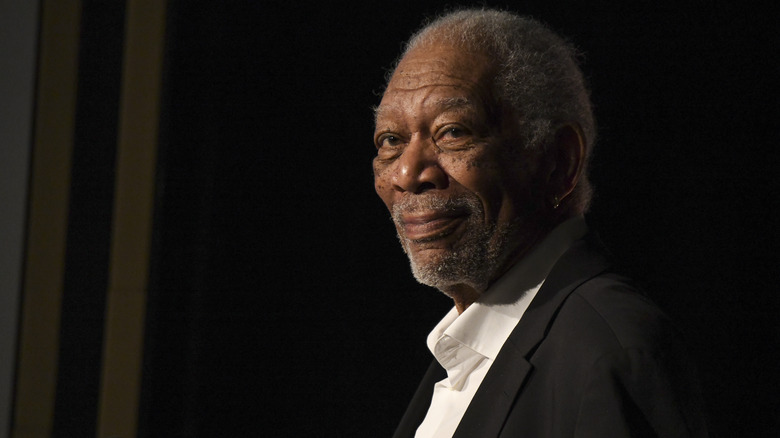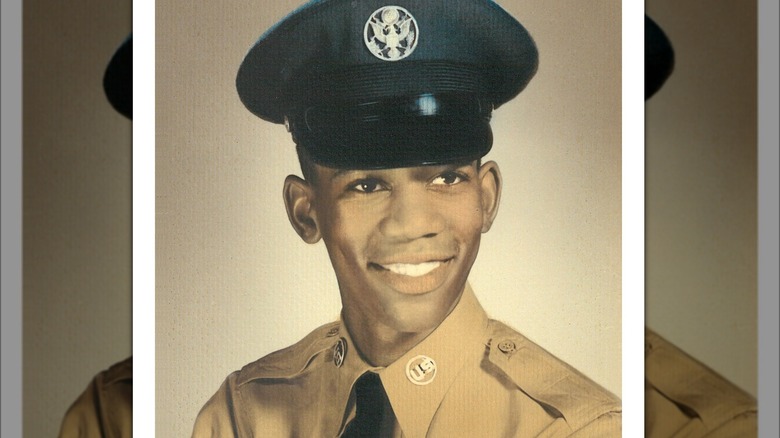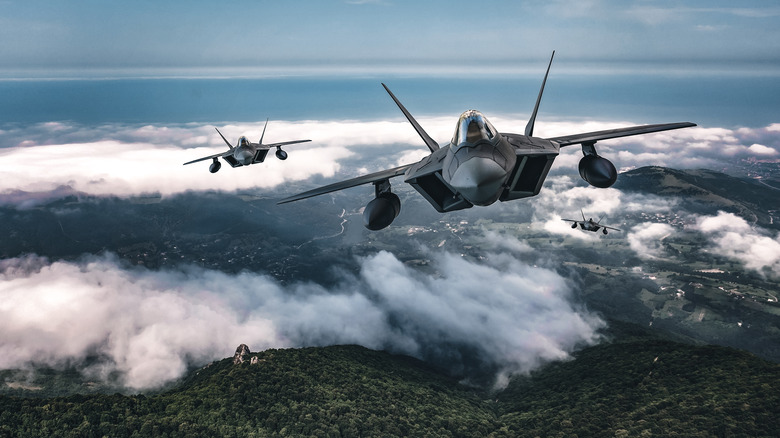The Unexpected Role Morgan Freeman Held In The Air Force
Morgan Freeman: world-class, award-winning actor and well-respected gentleman, cinema's preferred narrator for each and every project, father of four, and yes, Air Force veteran. That's right, long before Freeman was driving Miss Daisy, serving a life sentence at Shawshank State Prison, and solving cardinal sin-themed crimes with Brad Pitt, Freeman had a dream of flying. Four years before he headed to Hollywood to try his hand at the film industry in 1959, Freeman decided to join the Air Force, per Biography. He'd graduated from high school in 1955 and walked away from a drama scholarship to hit the skies. But rather than soar the clouds, Freeman wound up helping others do the same.
As the U.S. Department of Defense explains, Freeman trained to be an "automatic tracking radar repairman" in the Air Force after enlisting. Such technology was fairly new at the time; RCA's first patent on such tech dates to 1951, four years before Freeman enlisted. An occupational survey report from 1977 on the Defense Technical Information Center lists a comprehensive suite of skills needed for such a position, including expertise in electronics and radar equipment, in particular, the ability to assess and fix mechanical, electrical, and electronic problems, and more. While those skills seem worlds apart from the craft of acting, Freeman stuck with it for four years before being honorably discharged as an airman first class in 1959. That's when he moved to Los Angeles and dove into acting.
Radar repairman and airman first class
Morgan Freeman joined the military at an opportune time. World War II finished a decade earlier in 1945, the Korean War officially ended in 1953, the U.S. wouldn't join the Vietnam War until 1964, and the Cold War between the U.S. and Russia didn't necessitate sending missile strikes. In other words: Freeman wasn't pressured to fly and do combat training. While this might have disappointed him at the time, he later told AARP (via Biography) of the military, "I had this very clear epiphany. You are not in love with this; you are in love with the idea of this." Biography says that he also realized that he didn't want to be shooting down and killing other people.
And so, Freeman helped out on the ground on the technical side of things. As the U.S. Department of Defense explains, automatic tracking radar involved exactly what the name says: the use of radar antennas that automatically moved and tracked the positions of aircraft or missiles. Such technology — and the role of repairman that went along with them — got phased out in the 1990s when satellite-aided GPS technology took off. Air Force Technology says that GPS tech came online in 1995, with the Air Force in charge of the venture. Because GPS was much more precise and faster than radar, Freeman's old job was no longer needed. But that's okay because 1995 is also the year when "Se7en" came out.
The loss of one dream and the rise of another
As Military.com says, Freeman's interest in the military was partially connected to his interest in acting. As a kid he enjoyed theater as much as he enjoyed war movies, especially those featuring jets and pilots. This is why he enlisted in the Air Force when he graduated from high school in 1955.
It was apparently Freeman's choice — at least in part — to be a radar repairman. It took him a year of service to get the chance to finally sit in the cockpit of a jet, which is when he realized that he wasn't actually in love with flying. As he told AARP Magazine (via Military.com), "When I was getting close to being accepted for pilot training, I was allowed to get in a jet airplane. I sat there looking at all those switches and dials, and I got the distinct feeling that I was sitting in the nose of a bomb." And so, he spent the next three years as a technician. When his term of service was done, that was that. Freeman left the military on good terms.
But even in Hollywood Freeman didn't come to immediate success. As Biography says, it took until 1971 for Freeman to appear on "The Electric Company," a kid's educational program. Then in 1987 he got his break on "Street Smart," at 49 years old. It had been 32 years since he'd joined the Air Force.


